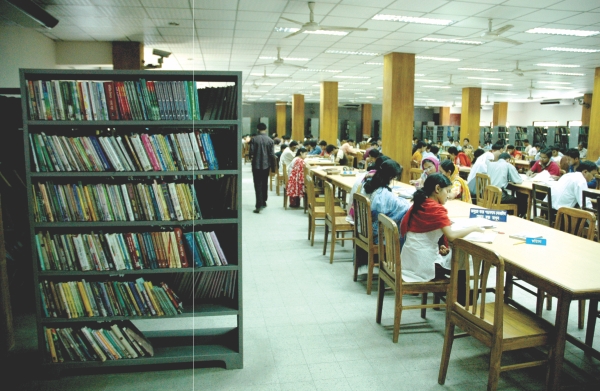| Home - Back Issues - The Team - Contact Us |
 |
| Volume 10 |Issue 43 | November 18, 2011 | |
|
|
Reflections Shrinking Facilities Akram Hosen Mamun The Central Public Library near Shahbag has been doing a great service by making books and journals accessible to a good number of readers for decades. According to the library website, the reading rooms usually get 2,500 readers everyday. A peek into the library in any given day would suffice to understand that the number of people who go there to quench their thirst for books is not small. The silent, well-lighted and air conditioned reading rooms are also a major attraction for the readers. However, a careful scrutiny of the library's management reveals how sheer callousness of the librarians and outdated indexing system results in frustrating the readers. Students of the adjacent Dhaka University (DU) who are regulars at the library, frequently complain that finding a desired book in the rows of shelves in the reading rooms is almost impossible; more often than not, the arrangement of books and the indexes fail to be of any assistance. Even if one follows the indexes and the catalogues, s/he is likely to search for a particular book for hours and end up finding it on a shelf where it was not supposed to be, in the first place.
Sajen, a student of International Relations, DU says that the indexes are simply not good enough to manage a large amount of books. “The catalogues or the librarians give only the shelf numbers but the shelves are pretty big and years of use have wiped the titles off the spines of many books. The consequences are obviously frustrating. Even if the desired book is in the shelf where the catalogue suggests, you might have to search for at least 30-40 minutes before finding it,” he says. Most of the big libraries around the world and also in Bangladesh have digitised their catalogues and indexes: readers can find books without even having to go to the libraries in person. According to official papers, a database of the books is uploaded in the library website. But in reality, the library does not even have any software to keep track of the books, let alone an online database. Needless to say, the information that one finds about the library in the website (http://www.centralpubliclibrarydhaka.org/) is meagre. Since the website is apparently the only source of valid information about the library, we looked at it. “As a depository library, it deposits all Bangladeshi publications under the Copyright. The library receives most of the Bangladeshi daily newspapers and periodicals,” says the website. In addition to that, the library gets two crore taka every year to buy new books. However, the deputy director, Md. Zillur Rahman, informed that the library has a collection of 185,000 books. Considering the number of books, journals and periodicals that are being published every year in the country and the allocation for buying new books, it seems rather strange that the library does not have a much bigger collection. Also strange is the frequent complaints by readers that books in this library are years old and the periodicals are at least a couple of months old. But after going through the shelves, the complaints do seem rather justified. There is, however, an abundance of the so called guides to Bangladesh Civil Service (BCS) and other Public Service Commission examinations in the reference section of the library. New graduates are always seen to be absorbed in these guide books in this section. But considering how the educationists and policy makers have been denouncing the publication of these guide books for years, it seems, again, rather strange that the library has so many of them. There is also some controversy regarding the library hours. Zillur Rahman, says that to give one hour of extra service to the readers, the authority has decided to close the reading rooms at 9 pm instead of 8 pm on weekdays. He added that unlike other government offices, the library remains open on Saturdays. However, only the science and reference section of the library opens on Saturdays. The library website says: “On July 26, 2003 [the library] started 24 hours reader service, which ceased on March 1, 2004 since drug abusers were taking opportunity of those hours.” When asked, Rahman said that the 24 hours service was experimental and that it took place towards the end of the last BNP-Jamaat regime. A DU graduate, unwilling to disclose her name, said that she had seen the 24 hours service as late as 2007. Asked to comment on what it was like when the library remained open for 24 hours, Rahman said that drug pushers and sex workers used the reading rooms and the restrooms as their safe house. He also brought in the issue of safety of the readers who used to leave the library late at night. He added that valuable books used to get stolen from the library in those days. There are so many security CCTV cameras in the reading rooms that one would think that it's impossible to do anything illegal in the premises with impunity. But people who pay frequent visits to the library informed that the cameras are either defunct or nobody cares to monitor them. “If books get stolen from the library, it's because of the negligence of the people who work here,” says a reader. Since public libraries around the world, by their very definition, are supposed to provide a service to the general public, most of them do not close their doors at night. In India, even most of the specialised university libraries remain open for 24 hours, not to mention libraries in the developed countries. Closing the library at night to fend off “drug abusers” is simply not a logical action.
Copyright
(R) thedailystar.net 2011 |
